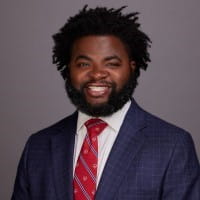 What was one of the most important factors you were looking for in a business school and why?
What was one of the most important factors you were looking for in a business school and why?
Coming from a liberal arts background, Booth was a chance to take classes directly related to my career. When I started at Booth in 2017, I was just 1 year into my career at Walgreens, and in my first managerial role. I knew this role was going to challenge me, especially in the areas of big data and data science. So the Booth curriculum was a great opportunity for me to deepen my expertise and work with increasingly complex and large data sets. It was also really beneficial for me to flex my data skills in a business context as opposed to an academic one, incorporating elements of strategy.
But Booth also helped me to develop my leadership style and grow my capacity for leading teams, not only within Walgreens but also in the communities I care about. We’ve all had the experience of working for someone with limited awareness of their deficits, and I never want to be that person. Through the Booth curriculum, I now have a better sense of my leadership strengths and development areas.
What are some of the challenges you’ve been able to conquer at work because of your Booth MBA?
I’ve been with Walgreens for 7 years now, and in that time I’ve been promoted twice to the role I have now as Director of Pharmacy Insights. Having the frameworks and tools to understand Walgreens’ business as my team was growing was immensely important. But I’ve also applied what I’ve learned about myself as a leader, for example, through tools like the motivation audit. I’ve become more thoughtful and deliberate about building partnerships, and confident in how I show up when working across the organization.
And of course, there have been tactical challenges too. Some of the projects my team takes on are so complex that simply having the vocabulary is helpful. Working with pharmacy data by definition means handling personal health information, so we have to be comfortable with getting our hands dirty with the data as opposed to using syndicated tools from vendors. Having worked with big data at Booth, I was better prepared to communicate with and manage the highly technical people on my team.
You will also soon be completing the Chicago Urban League's Impact Leadership Development Program; tell us about that experience.
Community and being able to address challenges in communities I care about is a fundamental part of my identity. I even wrote about it in my application to Booth; I talked about not just building my career, but leveraging the Chicago Approach and the Booth network, and bringing my skillset to the spaces that could benefit the most. So as soon as I graduated in 2020, I knew I wanted to fill my newfound freetime with something meaningful.
I actually learned about the Urban League’s Impact program through Booth; then Associate Dean for Part-time Programs, Ruth Reiner heard me talk about civic leadership and suggested I apply. And the program was particularly valuable, and dovetailed well with my Booth experience. Our cohort consists of roughly 40 young black professionals, all in Chicago, but from all different backgrounds. Over the course of 9 months, we discussed socio-political topics relevant in Chicago, like public schools, public safety, health disparities, and Chicago’s distinct legacy of segregation. Through the program, each of us was challenged to think how we might manifest our own leadership in these spaces that we care about. And now that the program is concluding, we’ve been discussing how we carry that forward: how we as a cohort can develop more of a collective mindset; how we might become a unit for collective action.
So, now that you’ve got that free time back in your schedule… what’s next?
Well, as part of the program, we have something of a capstone project, our leadership action plans. It feels daunting to put pen to paper on what that future looks like, but this will give me a chance to think about how all my experiences - board service, volunteering, mentoring, and my career can come together to create the impact I really want. I’ve also been thinking about my career, and how my job might come more into alignment with what my community needs. Walgreens is pivoting more into healthcare and we’re starting to have conversations internally about how to address disparities and promote health equity, for example. There’s actually lots of runway left for me to grow and have not just a business impact, but also a social one at work.
So for now, I'm continuing to think about how I can be more involved, especially in the civic discussions happening across Chicago; that means more local politics, building a deeper understanding of civic organizations and their jurisdictions, and all the nuance that comes with that. And in the meantime, I’ll continue to contribute as part of the BUILD Chicago and as Mentoring Chair for 100 Black Men of Chicago. Through my participation, I can only become more comfortable with my own abilities, and more confident that I can be a leader that connects in different contexts, and across communities.